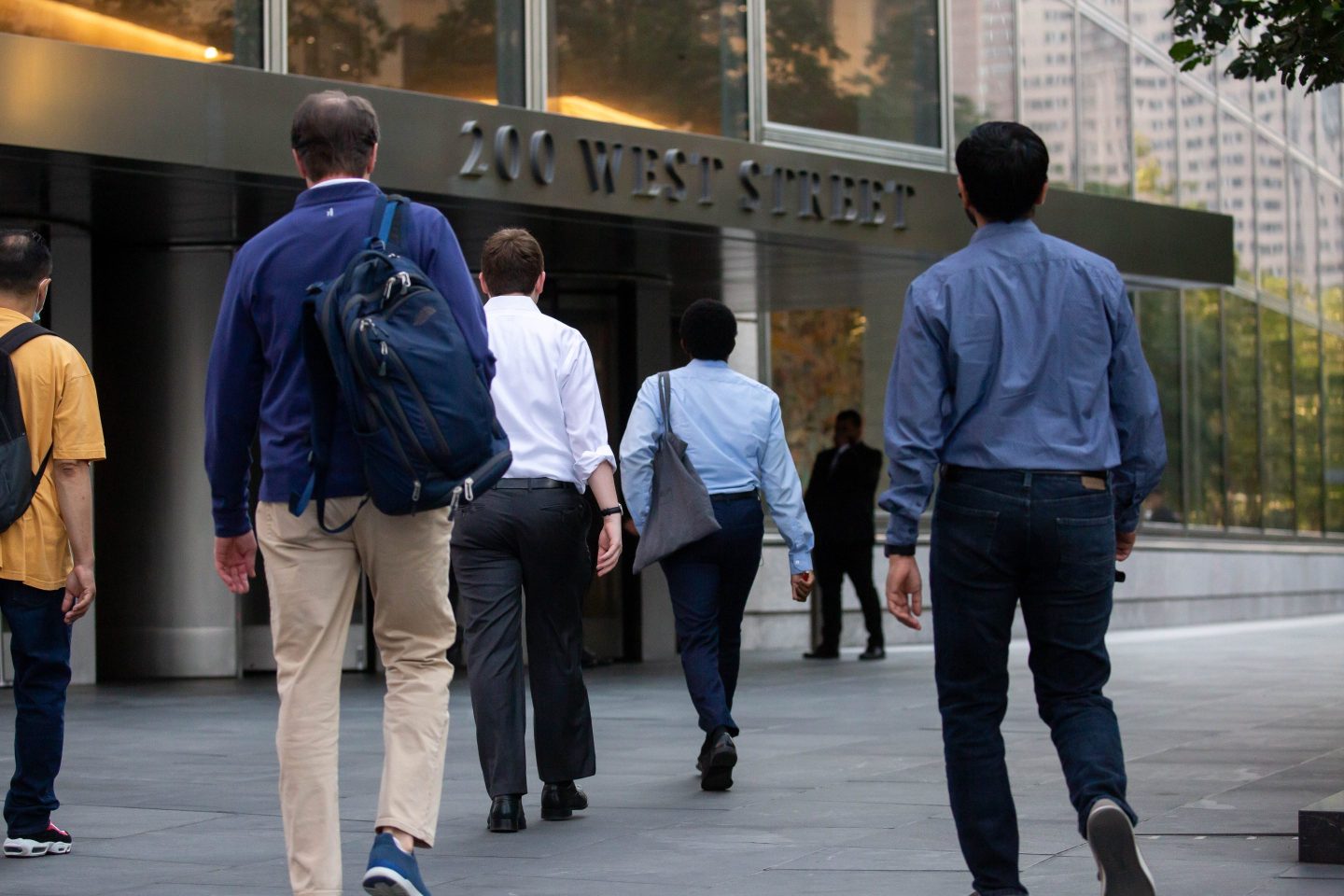Good morning!
Goldman Sachs polled around 2,000 of its summer interns on topics ranging from AI to their long-term relationships, job expectations, and even whether they watched Barbie or Oppenheimer this summer. (For those curious: 56% said they planned to view both movies this summer, while 23% expected to see just Oppenheimer and 11% only Barbie.)
Goldman’s intern cohort is exclusive—the bank accepted just 1.2% of applicants in 2022. The survey answers, shared exclusively with Fortune, offer insight into how Wall Street’s future leaders might tackle society’s most pressing issues and their expectations for their employers in the coming years.
“What we’re trying to do is hear directly from our next generation of talent, what they’re looking for in an employer and what motivates them, and learn more about how they live,” says Jacqueline Arthur, the firm’s global head of human capital management. “The more we can understand how the future workforce thinks about these things, the better we’ll be able to support them as professionals and help give them the tools they need to be successful.”
AI is top of mind for surveyed interns. Over one-third of respondents expect AI to have the most pronounced global impact in 10 years, the largest share of all responses selected. The second most popular answer is climate change, chosen by 30% of respondents.
Regarding AI, the vast majority (81%) believe the technology will positively impact society. That’s likely because this cohort already has extensive hands-on experience with AI. Eighty-six percent of respondents say they use generative AI tools in their personal lives, primarily to perform research (32%), assist with writing (31%), check codework (10%), and assist with classwork (9%).
“The fact that the next-gen of talent is already well versed in harnessing AI’s help for efficient ways of doing things, leads us to believe they’ll take that same approach at work,” Arthur says. Earlier this year, Goldman restricted employee use of third-party AI tools, including ChatGPT. (Other firms, including Citigroup and JPMorgan, have adopted similar policies.) However, the firm has started developing its own AI tools, including those aimed at increasing operating efficiency.
As they’ve warmed up to AI, interns’ previous fears over a recession have cooled down. Fifty-three percent expect a recession, down from 86% last year.
Most are thinking about long-term planning, family-wise and financially. Over the next 10 years, 89% expect to get married or end up in a formal relationship, 86% expect to buy a home, and 57% expect to have children. Over one-third (36%) expect to retire between the ages of 55 and 65, though another 30% expect to keep working as long as possible.
Job-hopping is less popular with this group. Most respondents plan to stay in their first job for two to five years (62% of respondents) or five to 10 years (20%). For comparison, the average employee tenure in January 2022 was 4.1 years, according to the Bureau of Labor Statistics. Goldman interns say their willingness to stay in a job is based on several factors, including the day-to-day tasks, who they work with, the values of the employer, opportunities for advancement, and work-life balance.
That could be a win for Goldman. According to a spokesperson, approximately 80% of interns land a full-time employment offer with the firm.
Paige McGlauflin
paige.mcglauflin@fortune.com
@paidion
Reporter's Notebook
The most compelling data, quotes, and insights from the field.
Goldman’s survey also explores how its interns find work-life balance and maintain their well-being, which is no simple feat given that junior staff work long hours. Sixty-five percent of respondents say they utilize digital tools like “do not disturb” and app time limits to disconnect. And they list relying on friends or family members, sleeping, and walking or exercising as their top three ways to prioritize health. Goldman says it offers interns employee wellness benefits, including access to office fitness centers, health centers, and its employee assistance program.
Around the Table
A round-up of the most important HR headlines.
- A former director is suing AstraZeneca for over $125,000 in bonuses she claims she didn’t receive because she chose to work remotely last year. The company argues that workers who didn’t return to the office were aware bonuses would be partially withheld, but the suit accuses the company of retroactively changing the policy. Bloomberg
- Hollywood executives and participants in the Writer’s Guild of America strike have reached a tentative deal to end the ongoing strike, which is now in its fifth month. CNBC
- Chipotle is testing a robot that can make up to 180 burrito bowls an hour more accurately than a human worker. Chipotle says it isn't interested in entirely removing the need for human employees, but rather, improving the customer and employee experience. Insider
Watercooler
Everything you need to know from Fortune.
Talking tech. Business leaders believe AI will have an “explosive” impact on workplace productivity. In a roundtable hosted by Fortune and McKinsey last week, Carmax CEO Bill Nash said that AI completed years of customer outreach work in just 90 days. But there are some concerns: Stan Bergman CEO Henry Schein said he’s worried about the long-term effects of AI productivity on company values and culture. —Alan Murray, Chloe Taylor
Lessons for leaders. What should managers consider when bringing employees back to the office? A few things, including identifying how the office experience differs for every employee. — Fortune editors
Slowing AI’s role. Israeli Prime Minister Benjamin Netanyahu offered a more pessimistic view of AI during a discussion of its safety with Elon Musk and other tech leaders last Sunday. Netanyahu’s main concern is AI-powered tech monopolies that could erase more jobs than they create. —Will Daniel
This is the web version of CHRO Daily, a newsletter focusing on helping HR executives navigate the needs of the workplace. Sign up to get it delivered free to your inbox.












